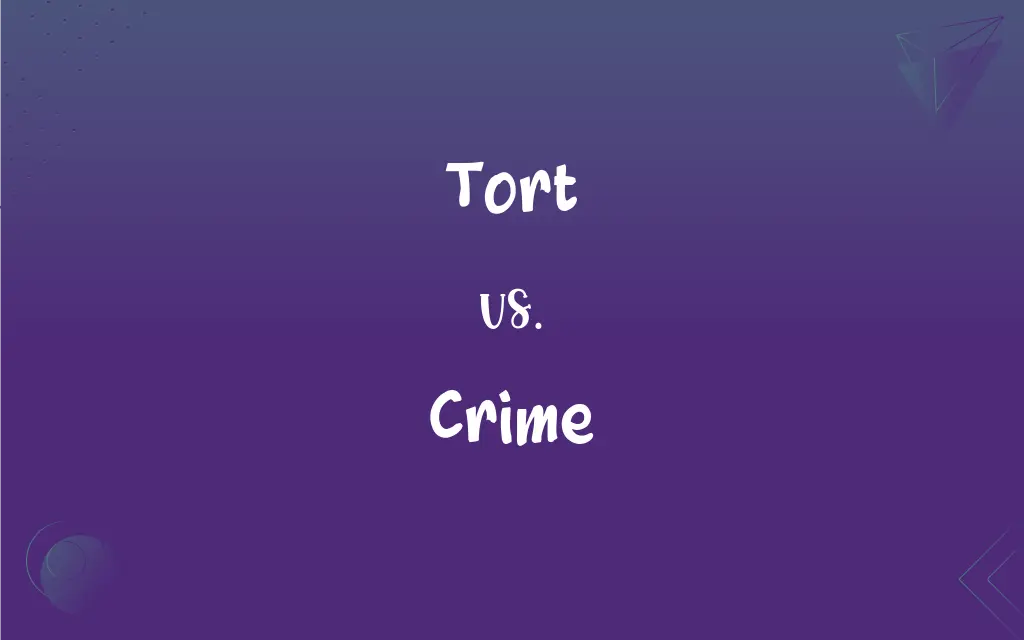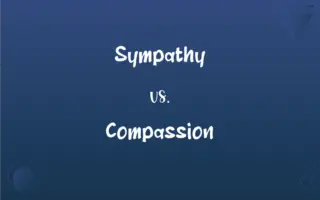Tort vs. Crime: What's the Difference?
Edited by Harlon Moss || By Janet White || Published on October 7, 2023
A tort is a civil wrong causing harm to an individual, leading to legal liability, while a crime is a legal offense against the state or public, punishable by law.

Key Differences
Torts and crimes are legal terms defining different kinds of unlawful acts. A tort is a civil wrong committed against an individual, causing harm or loss, for which the victim may seek damages in civil court. In contrast, a crime is considered an offense against the state or the public and is prosecuted by the state, potentially resulting in penalties such as fines, imprisonment, or probation.
The intent and consequences of torts and crimes can differ significantly. Torts may arise from negligence or intentional actions leading to personal injury or property damage, and the legal consequence is usually monetary compensation. Crimes, on the other hand, involve a violation of criminal laws and can result in both monetary penalties and other punitive measures, depending on the severity of the offense.
Torts typically involve private parties, and the legal proceedings are initiated by the injured party, seeking compensation for the harm suffered. Crimes involve public interest and are usually initiated by governmental authorities, aiming to maintain public order and safety by punishing the offender.
The burden of proof in torts and crimes is also different. In a tort case, the plaintiff must prove their case by a preponderance of the evidence, meaning it is more likely than not that the defendant caused the harm. In criminal cases, the prosecution must prove the crime beyond a reasonable doubt, a much higher standard, to convict the accused.
In essence, torts serve to provide relief to injured parties for harms caused by others and to assert and protect the rights of individuals, whereas crimes are viewed as offenses against the societal order and are dealt with to maintain law and order and to deter potential offenders.
ADVERTISEMENT
Comparison Chart
Nature
Civil wrong causing harm to an individual.
Legal offense against the state or public.
Legal Proceedings
Initiated by the injured party.
Prosecuted by the state.
Consequences
Usually monetary compensation.
Fines, imprisonment, probation, etc.
Burden of Proof
Preponderance of the evidence.
Beyond a reasonable doubt.
Intent
May be intentional or due to negligence.
Involves violation of criminal laws.
ADVERTISEMENT
Tort and Crime Definitions
Tort
An act causing injury for which the injured party can bring civil action.
The breach of contract resulted in a tort, leading to a lawsuit.
Crime
An act punishable by law, usually considered harmful or dangerous.
Assault is a crime involving harm or threat of harm to others.
Tort
A violation of a duty imposed by the civil law.
The property owner’s failure to remove ice was a tort, causing a slip and fall.
Crime
A violation of a law prohibiting certain conduct.
The act of vandalism was reported as a crime to the local police.
Tort
A non-contractual civil wrong leading to legal remedy.
The defamation caused by false statements constituted a tort.
Crime
An illegal act against the public or state.
Tax evasion is a serious crime with severe penalties.
Tort
A wrongful act leading to legal liability.
The manufacturer committed a tort by producing a defective product.
Crime
A breach of legal duty treated as a public wrong.
Committing fraud is a crime that undermines trust.
Tort
A wrong that is committed by someone who is legally obligated to provide a certain amount of carefulness in behavior to another and that causes injury to that person, who may seek compensation in a civil suit for damages.
Crime
An act committed in violation of law where the consequence of conviction by a court is punishment, especially where the punishment is a serious one such as imprisonment.
Tort
(law) A wrongful act, whether intentional or negligent, regarded as non-criminal and unrelated to a contract, which causes an injury and can be remedied in civil court, usually through the awarding of damages.
Crime
Unlawful activity
Statistics relating to violent crime.
Tort
(obsolete) An injury or wrong.
Crime
A serious offense, especially one in violation of morality.
Tort
(slang) tortoise
Crime
An unjust, senseless, or disgraceful act or condition
It's a crime to waste all that paper.
Tort
(slang) tortoiseshell; a tortie.
Crime
(countable) A specific act committed in violation of the law.
Tort
(obsolete) Twisted.
Crime
(countable) Any great sin or wickedness; iniquity.
Tort
Synonym of tart}} {{gloss
Crime
That which occasions crime.
Tort
Synonym of taut
Crime
(uncountable) Criminal acts collectively.
Tort
(nautical) Of a boat: watertight.
Crime
(uncountable) The habit or practice of committing crimes.
Crime doesn’t pay.
Tort
Mischief; injury; calamity.
That had them long opprest with tort.
Crime
To subject to disciplinary punishment.
Tort
Any civil wrong or injury; a wrongful act (not involving a breach of contract) for which an action will lie; a form of action, in some parts of the United States, for a wrong or injury.
Crime
(nonce word) To commit crime.
Tort
Stretched tight; taut.
Yet holds he them with tortest rein.
Crime
Any violation of law, either divine or human; an omission of a duty commanded, or the commission of an act forbidden by law.
Tort
(law) any wrongdoing for which an action for damages may be brought
Crime
Gross violation of human law, in distinction from a misdemeanor or trespass, or other slight offense. Hence, also, any aggravated offense against morality or the public welfare; any outrage or great wrong.
Tort
A civil wrong causing harm or loss to an individual.
Negligence in a car accident can be considered a tort if it causes injury.
Crime
Any great wickedness or sin; iniquity.
No crime was thine, if 'tis no crime to love.
Crime
That which occasion crime.
The tree of life, the crime of our first father's fall.
Crime
(criminal law) an act punishable by law; usually considered an evil act;
A long record of crimes
Crime
An evil act not necessarily punishable by law;
Crimes of the heart
Crime
An action or omission that constitutes an offense punishable by law.
Theft is a crime that can result in imprisonment or fines.
FAQs
Is a crime prosecuted by the state?
Yes, crimes are considered offenses against the state or public and are prosecuted by the state.
Is a tort a legal wrong against an individual?
Yes, a tort is a civil wrong causing harm to an individual, leading to legal liability.
Can torts result in monetary compensation?
Yes, torts typically result in the liable party paying monetary compensation to the injured party.
About Author
Written by
Janet WhiteJanet White has been an esteemed writer and blogger for Difference Wiki. Holding a Master's degree in Science and Medical Journalism from the prestigious Boston University, she has consistently demonstrated her expertise and passion for her field. When she's not immersed in her work, Janet relishes her time exercising, delving into a good book, and cherishing moments with friends and family.
Edited by
Harlon MossHarlon is a seasoned quality moderator and accomplished content writer for Difference Wiki. An alumnus of the prestigious University of California, he earned his degree in Computer Science. Leveraging his academic background, Harlon brings a meticulous and informed perspective to his work, ensuring content accuracy and excellence.








































































